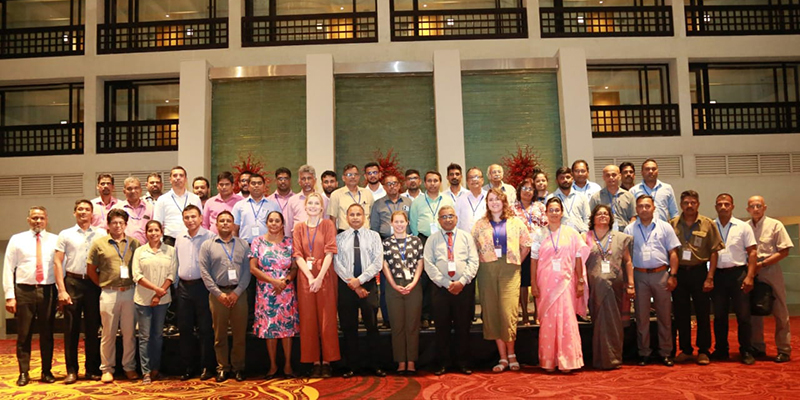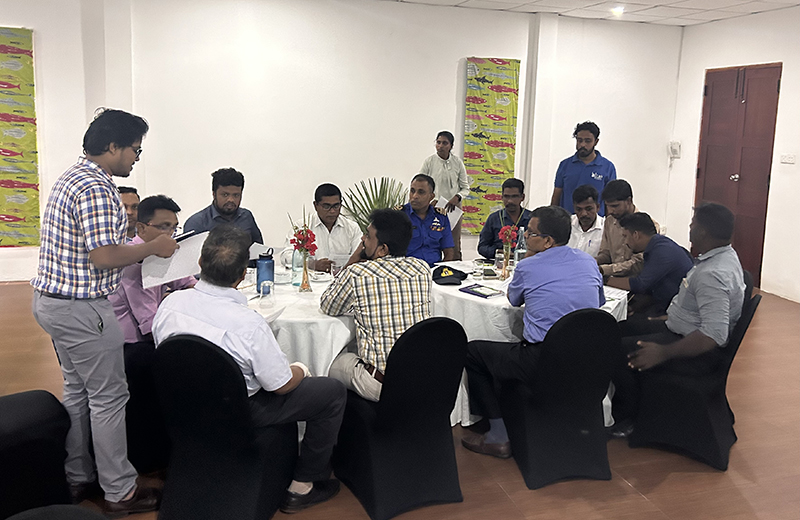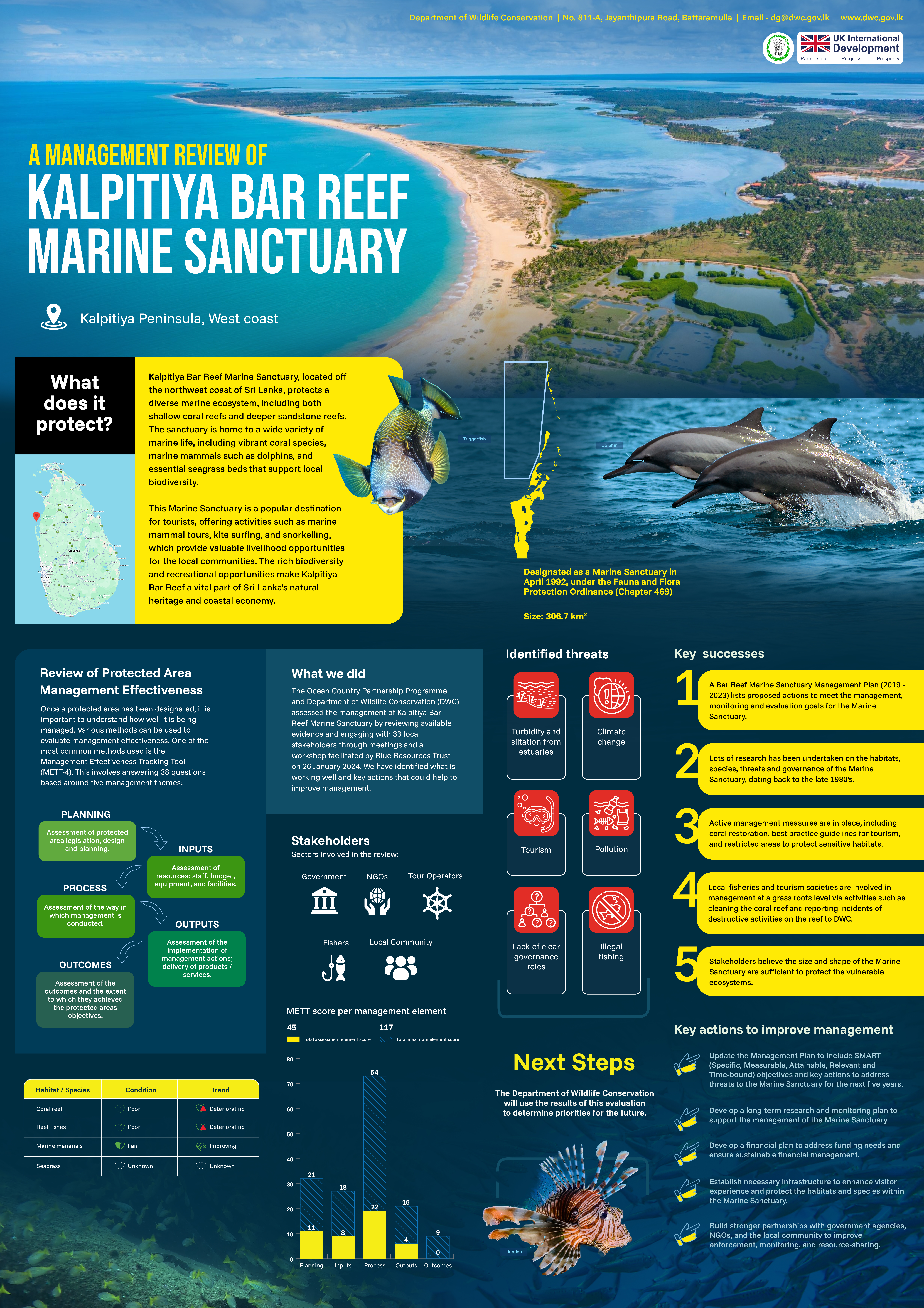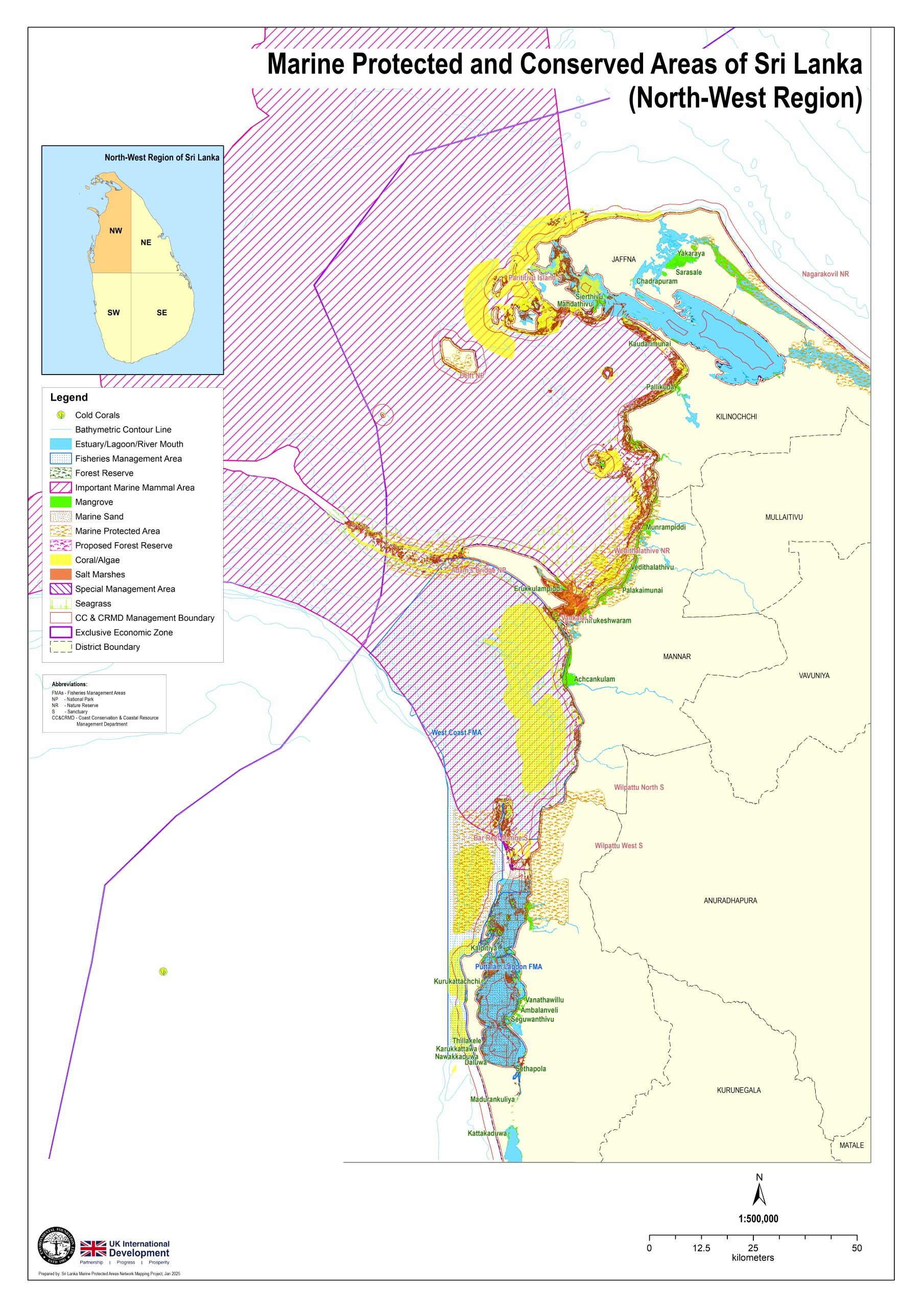Sri Lanka has been identified as one of the 36 global biodiversity hotspots, with a high level of endemic biodiversity both in the terrestrial and marine environments. With a coastline of 1,620 km, the country's continental shelf is broad to the north and north-west but ends more abruptly to the south and south-east, creating a wide range of marine ecosystems. The country is home to 15 species of seagrass, over 20 mangrove species (one-third of global true mangrove species), 209 hard coral species, 29 marine mammal species including resident blue whales and dugongs, 5 species of sea turtle and over 1,000 species of fish.
The livelihoods of people in Sri Lanka are highly dependent on marine and coastal ecosystems, with fisheries and tourism being two of the country’s main livelihoods. Whilst Sri Lanka’s marine environment now faces many threats and challenges, Sri Lanka has also recognised the importance of sustainably managing and protecting it’s unique marine environments. It has committed to increase marine protection through national legislation and international commitments, such as the 30-by-30 initiative.
Introduction
The Ocean Country Partnership Programme (OCPP)is partnering with the Government of Sri Lanka to support effective management of their marine environment. The partnership is delivered by JNCC, Cefas and the Marine Management Organisation (MMO), and is focused on providing demand-led technical assistance around the three key themes of OCPP: marine biodiversity, marine pollution and sustainable seafood.
The focus of JNCC’s work in Sri Lanka is two-fold:
- To provide support for Sri Lanka’s MPAs and marine biodiversity, with an emphasis on ensuring Sri Lanka’s MPA network has the resource and tools required to meet the country’s conservation ambitions and biodiversity commitments.
- To provide marine pollution emergency response support for Sri Lanka, with a focus on the environmental aspects of prevention, preparedness and response. To find out more about this area of work please visit the OCPP Emergency Response hub page.
If you have any questions about our OCPP work, please get in touch.
Sri Lanka OCPP Work Areas
Working in partnership with the Government of Sri Lanka and non-governmental organisations (NGOs), marine biodiversity activities have focused on supporting the effective monitoring and management of MPAs, Protected, Endangered and Threatened (PET) marine species, and important habitats such as seagrass.
The sections below summarise some of our current and past work areas. Outputs from these work areas can viewed in the Resources section.
MPA Implementation Best Practice

The OCPP has worked in collaboration with Sri Lanka’s Department of Wildlife Conservation (DWC) to build expertise and understanding of MPA implementation amongst DWC staff and other key government departments. Historically, the DWC have focused on the management of terrestrial protected areas but within recent years their remit has expanded to include MPAs. The OCPP has provided training and resources that draw on international best practice and case studies from Sri Lanka, the UK and further afield, on each stage of the MPA Implementation Cycle.
A two-day MPA Best Practice training workshop was held in August 2023 focused on DWC rangers. Subsequently an MPA Implementation Best Practice Toolkit has been developed, providing chapters on each stage of the MPA Implementation Cycle. Additional case studies, lessons learned and useful links to wider resources on MPAs are included. The Toolkit is available in English, Sinhala and Tamil and is intended as a resource for those actively involved in MPA designation, management, monitoring, and evaluation in Sri Lanka.
Building an understanding of best practices throughout the MPA implementation process, can encourage a standardised approach to MPA management across Sri Lanka. It will also support Sri Lanka in meeting its international commitments, including 2030 targets for marine protection under the Kunming-Montreal Global Biodiversity Framework.
Further information on the workshop and toolkit can be viewed in the Resources section.
Protected Area Management Effectiveness (PAME)

PAME assessments are tools used globally to help protected area managers to measure and understand the impact of their management actions on protected areas. They help to track progress towards the goals and objectives of the protected area, identifying priorities to improve future management and enable effective resource allocation.
First developed in 2002, the METT assessment was one of the first PAME tools to reflect the IUCN WCPA Framework for PAME and is one of most used PAME assessments globally. For more information on the METT assessment tool and the latest version (METT-4) visit the Protected Planet website.
The OCPP has supported the completion of METT-4 assessments for the DWC to better understand the current management effectiveness of their MPAs. The assessments have been completed in two-phases.
Phase I
In 2024, OCPP supported the completion of five MPA METT-4 assessments:
- Adam’s Bridge National Park
- Great Basses and Little Basses Marine Sanctuary
- Kalpitiya Bar Reef Marine Sanctuary
- Kayankerni Marine Sanctuary
- Pigeon Island National Park
The Adam’s Bridge National Park and the Great Basses and Little Basses Marine Sanctuary assessments were completed by OCPP with input from the management authority (DWC). Relevant DWC staff were introduced to the METT-4 assessments process and then walked through the assessment for both MPAs, to allow DWC to answer each assessment question. These answers were then combined with evidence identified during a literature review, to provide the final assessment.
The assessments for Kalpitiya Bar Reef Marine Sanctuary, Kayankerni Marine Sanctuary and Pigeon Island National Park were completed with input from a wider range of stakeholders, including the DWC, other relevant government departments, NGOs, academia and local communities. Blue Resources Trust were contracted to support the delivery of three one-day PAME workshops within the local areas adjacent to these MPAs.
During the workshops, 26 targeted questions were asked to gather the information required to complete the 38 questions in the METT-4 assessments. The responses were collated, together with published evidence and expert opinion, to complete the assessments.
The completed METT-4 assessments are being used to inform the development of Management Plans by DWC and will also form the baseline PAME assessment for the IUCN Sri Lanka Coral Reef Initiative at Kalpitiya Bar Reef Marine Sanctuary, Kayankerni Marine Sanctuary and Pigeon Island National Park.
Phase II
In 2025, OCPP supported the completion of three METT-4 assessments:
- Vedithalathive Nature Reserve
- Hikkaduwa National Park
- Vankalai Sanctuary
Blue Resources Trust were contracted to complete the entire METT-4 assessment process on behalf of the DWC and the OCPP. Blue Resources Trust completed literature reviews for each MPA and coordinated stakeholder workshops to gather local stakeholder input to the assessments.
Following a training session by OCPP staff, Blue Resources Trust collated the information and evidence for each MPA to complete the METT-4 assessments. The completed METT-4 assessments are being used to inform the development of Management Plans by DWC.
Blue Resources Trust, on the request of DWC, also conducted an initial literature review and stakeholder workshop for the Mirissa area. Mirissa is an important area for marine mammals and is a hub for whale watching tourism. DWC are considering the designation of a new Marine Sanctuary in the area for marine mammals. It was determined that it wasn’t appropriate to complete a METT-4 assessment at this point, however, the literature and stakeholder input will be collated into a report for DWC, to inform ongoing discussions.
METT-4 Outreach
METT-4 assessments often remain the property of the relevant management authority (in this case DWC), and it is their decision what information from the assessment can be shared with the public. This can lead to local stakeholders who provided input, not seeing how their contribution is used. Additionally, the opportunity to improve awareness of the MPA and its management is missed.
OCPP contracted Inbound Hype, to develop summary posters for each completed METT-4 assessment in collaboration with DWC, that can be shared with the public. These posters provide key information about the MPA, including the status of protected habitats and species, identified threats, management successes, and recommended actions for improving management.
The posters are available in English, Tamil and Sinhala (see the Resources Section) and have also been developed into a leaflet format.
The posters were also printed and distributed to each MPA, where they will serve as valuable outreach materials for DWC staff and the public.

Marine Protection Mapping and Network Analysis

Sri Lanka, like many countries, has a range of environmental legislation, which provide mechanisms to protect the environment under different legislative tools and authorities. OCPP in discussion with Sri Lankan colleagues, recognised that Sri Lanka was missing publicly available information on types of environmental protection occurring in the marine environment. Additionally, as Sri Lanka looks to contribute to national and international commitments to improve and expand protection and conservation, there was limited information on how successful the current network of protection was at delivering these objectives.
The OCPP worked collaboratively with Environmental Foundation Limited (EFL) to develop a project to collate available information, develop new spatial layers and maps where needed, and to review the existing network of protection in Sri Lanka’s marine waters. The focus of the project was to look at:
- Marine Protected Areas designated by DWC under the Flora and Fauna Protection Act.
- Fisheries Management Areas designated by the Department of Fisheries and Aquatic Resources under the Fisheries Act.
- Special Management Areas designated by Coast Conservation & Coastal Resource Management Department under the Coast Conservation Act.
Through collaborative meetings and workshops with a wide range of relevant stakeholders, EFL identified the missing information, digitised missing spatial layers for protection types, mapped the current marine protection network and completed an analysis of the success and challenges facing the existing network with recommendations as to how to improve.
To view all the produced maps, available spatial layers and reports please see the Resources Section.
Accessible MPA information
Through OCPP’s biodiversity work and discussions with Sri Lankan colleagues, it was recognised that current information on Sri Lanka’s MPAs is scattered across multiple websites and resources, that may not be digitised or publicly available. This makes it difficult for anyone trying to access information on MPAs to find correct, up-to-date information.
OCPP contracted Inbound Hype to complete a MPA website scoping report. This involved reviewing existing website platforms and reaching out to over 120 stakeholders to ask their opinion on accessing information on Sri Lanka’s MPAs and a proposed website. The resulting report can be found in the Resources Section.
OCPP also connected the DWC with the team at UNEP-WCMC who manage the World Database of Protected Areas. With OCPP and UNEP-WCMC support, DWC have updated the listings for Sri Lanka’s MPAs to ensure all MPAs designated since 2015 are now registered on the database.
National Seagrass Habitat Mapping and Training
In collaboration with Northumbria University, the OCPP is supporting the development of Sri Lanka’s first national seagrass habitat map using open access remote sensing data.
There is currently little data available on seagrass habitat extent and condition on a national scale across Sri Lanka, including in MPAs where seagrass is a protected feature. The development of a national seagrass presence/absence map will support evidence-based decision making regarding the protection of seagrass beds of Sri Lanka, inform seagrass restoration efforts, support Environmental Impact Assessments, Marine Spatial Planning efforts and provide evidence for the designation of new MPAs to protect blue carbon habitats and to meet Sri Lanka’s ambitions towards 30x30.
Training on the seagrass mapping methodology was delivered in June 2025 to 42 Sri Lanka government personnel, academics, NGOs and students to build mapping expertise and capacity in Sri Lanka. Enhancing the longevity of the maps which can be updated to track shifts in seagrass distribution and improve the detail and accuracy of the maps over time.
This project is supported by Blue Resources Trust and Cefas who have provided ground truthing data to validate the seagrass mapping models. A short video highlighting the project for World Seagrass Day in March 2025 and the outputs of this project will be added to the Resources section as they become available.
Protected, Endangered and Threatened Mobile Marine Species

Sri Lanka’s waters are home to an array of Protected, Endangered and Threatened (PET) mobile marine species including whales, dolphins, turtles, seabirds, sharks and rays. Each species performs ecologically important roles within the marine environment and provides a source of income to coastal communities via ecotourism. There is a need to increase awareness and address knowledge gaps related to the condition and distribution of these species in Sri Lanka, as well as to better understand the impact and nature of the threats to them.
The OCPP has contracted Oceanswell, Sri Lanka’s first marine conservation research and education organisation, and the International Whaling Commission (IWC), the global body responsible for management of whaling and conservation of whales, to deliver a package of support including:
- Coastal community education and awareness workshops that reach over 400 individuals from local communities.
- Scoping to incorporate citizen science data collection to bolster monitoring efforts.
- Training on sampling and strandings response protocols and data collection methods.
- Advanced necropsy training for veterinarians and pathologists.
- Facilitation of networking opportunities between Sri Lankan experts and global networks for monitoring and strandings networks for PET mobile marine species.
By improving knowledge and understanding of Sri Lanka’s PET marine species, and technical expertise in data collection, effective conservation and management measures can be developed, with benefits for the target species, local coastal communities and the wider marine environment.
Outputs from this package of work will be added to the Resources section as they become available.
Resources
Published pieces of work associated with the listed activities undertaken through the OCPP-Sri Lanka Government partnership can be found in this section and will be added throughout the programme.
MPA Implementation Best Practice
- MPA Best Practice Toolkit in English, Tamil and Sinhala
- MPA Best Practice Workshop Report
METT-4 Outreach
- METT-4 Posters and Leaflets in English, Tamil and Sinhala
- PAME Assessments and Workshops 2025 Summary Report
Marine Protection Mapping and Network Analysis
- Inception Meeting Report
- Marine Protection Mapping and Analysis Report
- Final Report
- Spatial Layers for Marine Protection
Accessible MPA Information
Protected, Endangered and Threatened Mobile Marine Species
Seagrass
Additional resources are in the process of being published in this section.
Categories:
Published:
